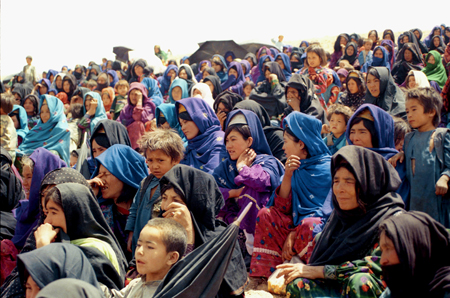
Politically Motivated Address on Women’s Rights Undermines Democracy
Statement of the Equality Social and Cultural Organization and Afghanistan Think Room about President Hamid Karzai’s Support for Afghanistan Ulema Council’s Restricting Guidelines for Afghan Women
Reading time: (Number of words: )
All the versions of this article: [English] [فارسى]
While reports by human rights advocates and the media show an increase of violence against Afghan women, President Hamid Karzai’s support for guidelines declared by Afghanistan’s Ulema Council (Islamic Clerics) suggesting to impose new restrictions on Afghan women, has concerned women’s rights advocates as well as democratic organizations.
As a part of the Afghan civil society and women’s rights community, the Equality Social and Cultural Organization and Afghanistan Think Room raise their grievous concerns about the recent declaration by the Ulema Council as well as the nontransparent Taliban reconciliation process which potentially sacrifices ten years of recent democratic achievements.
Restrictions outlined within the Ulema Council declaration and the state’s support for those restrictions demonstrates that a new movement, defined by religious extremism and political opportunism, is being established in order to restrict women’s, human, and legal rights. The state’s political support for the restrictions has doubled our concerns; particularly as such support has been unprecedented in the past ten years.
The statement of the Ulema Council and the President’s support for it show that the Afghan government seeks to achieve its political goals by sacrificing the rights of 50% of the country’s population. Within this politically motivated compromise, the state is actually pushing women backwards into the same grievous conditions they suffered a decade ago.
Such incidents happen at a time when Afghan women continue to suffer. Afghan women expect their government to support them to overcome their challenges, not undermine their achievements, and not use them as a political tool.
The holy religion of Islam has paid much attention to women’s human dignity. Such attention was being paid to women by Islam at a time that they were deprived of their fundamental rights. Further, the Constitution of Afghanistan, which was created within the framework of Islamic law, emphasizes the rights of women.
Considering the low level of literacy among Afghans, the Ulema statement will undoubtedly increase the level of violence against women as it emphasizes restrictions on women’s presence in public life.
Given the worsening security situation and weakness of judicial bodies in most parts of the country, imposing restrictions on women will pave the way for increasing incidences of social, economic, cultural and family violence against women; will deteriorate their living conditions; and will ultimately result in the tragic death of more women.
Moreover, such discrimination will damage the current democratic political system which has been achieved through the efforts of millions of Afghan men and women, some of whom have even sacrificed their lives for it. Democracy, security and justice will be meaningless without women’s involvement in those systems.
Afghanistan Think Room and the Equality Social and Cultural Organization embrace the role of religious scholars in increasing public awareness and enlightening the minds of people, but we hope no one sacrifices religious values for political purposes.
March 13, 2012
Afghanistan Think Room and the Equality Social and Cultural Organization
For more information contact:
Masuma Mohammadi - The Equality Social and Cultural Organization 0093(0)799 359 155
Murtaza Meraj - Afghanistan Think Room 0093(0)787 616 280

Poems for the Hazara
The Anthology of 125 Internationally Recognized Poets From 68 Countries Dedicated to the Hazara
Order Now








